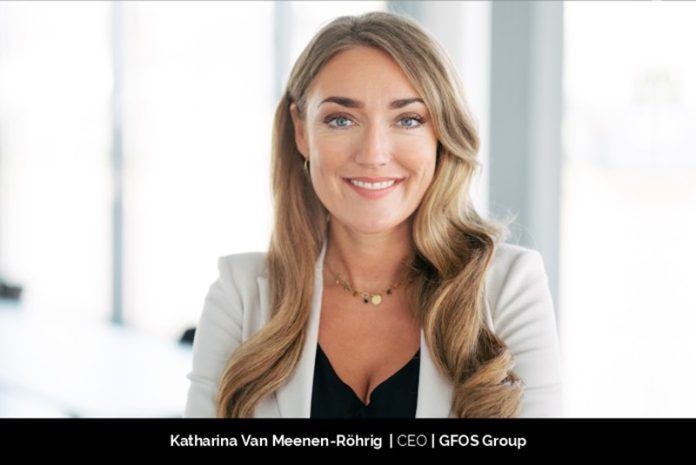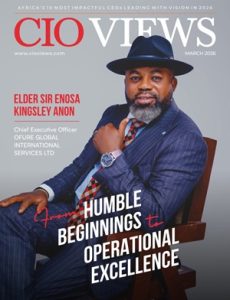Katharina Van Meenen-Röhrig, CEO of GFOS Group, acknowledges that success is a multifaceted concept, characterized by varying interpretations depending on individual perspectives, situations, and contexts. Generally, it is associated with the achievement of goals, progress, growth, and a sense of contentment.
She notes that success can manifest differently for different people: some may define it through financial accomplishments, professional recognition, or exceptional performance in their respective fields, while others may find it in personal fulfillment, pursuing individual aspirations, or contributing positively to society. However, Katharina’s perspective on success extends beyond external performance criteria. She places equal importance on factors such as inner contentment, happiness, well-being, and alignment with one’s values and beliefs.
In her view, an individual may achieve outward success but still feel unhappy or experience a disconnect between their behavior and their deeply held beliefs, which can significantly influence their perception of success. She also emphasizes the non-linearity of success. Challenges and setbacks are an inherent part of the journey toward success. What may initially appear as setbacks often prove to be valuable learning experiences in hindsight.
Katharina recognizes that individuals can emerge from such episodes with personal growth, valuable lessons learned, and achievements that surpass their previous limits. She sees success as a dynamic concept that evolves throughout a person’s life to mirror their changing values, goals, and aspirations at different stages.
A Collective Commitment to Continuous Improvement
Katharina’s father founded GFOS in 1988, making it a significant part of her upbringing. Although she initially embarked on a different career path, she quickly developed a profound passion for the company and its business. Assuming the role of CEO offers her the freedom to shape the company according to her vision, but it also entails numerous challenges. She is drawn to the opportunity to set the course, refine processes, confront challenges head-on, and devise solutions for intricate problems.
As a second-generation leader at GFOS, Katharina has always been aware of the substantial responsibility and the significant shoes she must fill. This awareness has greatly influenced her career journey from the very beginning. Since assuming her role as the company’s leader, she has approached it with the utmost reverence, recognizing that her decisions impact the careers and livelihoods of numerous individuals within the organization.
One of the initial challenges she faced was striking the right balance between upholding her parents’ work and legacy within the company and forging her own path. Even today, the most meaningful form of recognition she receives from her colleagues and employees is their trust in her leadership. This trust validates her decision to pursue the demanding path of transformation and underscores how their collective commitment to continuous improvement propels them toward greater success.
As CEO, Katharina wields substantial influence over the company’s direction and culture. She sees the CEO position as a remarkable opportunity for personal growth and professional development, not only for herself but also for others. The responsibility for the well-being of the entire enterprise compels her to acquire new skills and apply them effectively. The journey to becoming a CEO demands hard work, dedication, sacrifices, and ongoing development, all of which she embraces with enthusiasm, pushing herself beyond her limits in the process.
Katharina subscribes to the belief that “facing challenges makes you stronger,” a widely held notion. She recognizes that overcoming adversity, obstacles, and predicaments can foster personal growth, resilience, and character development. This concept rests on the idea that challenges provide opportunities to acquire new skills, undergo learning experiences, and fortify inner strength. Challenges often necessitate the development of fresh approaches and strategies, facilitating the acquisition of valuable skills and expanding knowledge.
Overcoming challenges also cultivates emotional resilience, enabling more effective coping with stress, uncertainty, and change. Katharina asserts that realizing one’s capacity to handle adversity boosts confidence in one’s abilities. Challenges can prompt shifts in perspectives, leading to reevaluations of mindsets, values, and goals.
She believes that nothing should be set in stone, emphasizing the potential for change. Ultimately, whether facing challenges leads to greater strength depends on various factors. Katharina also emphasizes the importance of having realistic expectations and seeking support when needed.
Fostering an Agile and Positive Work Environment
As a CEO, Katharina manages a demanding and multifaceted set of responsibilities. She places a high level of importance on the well-being of the employees, the success of the company, and the growth of GFOS. In her role as CEO, she understands that the ultimate responsibility for all company matters rests with her.
Katharina acknowledges the invaluable support she receives from a team of excellent leaders within the organization, which has allowed her to shift her focus away from operational concerns. Her current attention is primarily directed towards strategic planning, leadership, and management, decision-making, financial management, cultivating client relationships, communication, talent management, and representing the company both internally and to the public, among other responsibilities.
She is grateful that she doesn’t have to shoulder this workload alone and shares the significant role of CEO with her husband and co-CEO, Dr. Ignace Van Meenen. Their unique partnership in sharing the CEO role allows them to seamlessly blend their professional and personal lives, recognizing that they are not just CEOs, but also parents and spouses.
Their shared office space enables them to have face-to-face discussions whenever needed, whether related to work or personal matters. In essence, their professional and private lives are deeply intertwined, demanding meticulous planning, effective time management, organizational skills, and a considerable amount of passion.
Katharina and her husband are dedicated to helping their employees strike an ideal work-life balance. They actively promote creative solutions to address personal challenges and offer flexibility whenever possible. Operating as an owner-operated enterprise, they enjoy the advantage of making swift decisions without the burden of excessive bureaucracy. Their workforce appreciates this agility, understanding that it fosters a positive work environment.
“Dynamic, engaging, innovative, and solution-oriented—that’s GFOS!”
How Modern Technologies Influence the Software Industry
Katharina, being unbound to a specific industry, offers insights into the software business in general. She observes that modern technologies wield a significant influence across the industry, evident in various ways:
- Software-development automation: Practices such as automated testing, continuous integration, continuous deployment (CI/CD), and the adoption of development and IT operations (DevOps) methodologies contribute to enhanced efficiency in software development, deployment, and maintenance.
- Cloud platforms: The widespread integration of cloud platforms has simplified the process of deploying and scaling software. Developers now have access to abundant resources, utilizing them only as necessary, which increases flexibility and reduces costs.
- AI and ML: The utilization of AI and machine learning (ML) is on the rise in software development. These technologies aid in pattern recognition, predictions, automated decision-making, and overall improvements in user experiences.
- Collaboration: Modern IT fosters collaboration in software development. Platforms like GitHub allow for the launch of open-source software projects, facilitating sharing and collaborative development.
- Microservices architecture: Designing modern applications around a microservices architecture allows for their division into smaller, independent services. This architectural style not only simplifies scalability and maintenance but also enhances agility.
- Security and data protection: Modern technologies enable advanced security measures and data protection precautions, including the integration of security solutions, encryption, and identity and access management.
- Edge computing: Shifting computing power and data processing to the edge of the network, known as edge computing, reduces latency and enables real-time processing for applications that require rapid responses.
- Mobile apps and IoT applications: Modern technologies have spurred the development of mobile apps and Internet of Things (IoT) applications, creating numerous new business opportunities. The proliferation of networked devices and smartphone apps has played a pivotal role in this expansion.
- Big data: The ability to collect, process, and analyze big data has become more accessible. This data-driven approach empowers individuals and organizations to make informed decisions, driving smart improvements in products and services.
Katharina emphasizes that these examples underscore the profound impact of modern technologies on the software industry. The continuous advancement of technology shapes how software is developed, deployed, and used. It presents a perpetual source of both opportunities and challenges for developers, businesses, and users alike.
Designing The Future of Work
GFOS, founded by Katharina’s father in 1988, when she was just one year old, has evolved into an international business. It is on track to reach an annual revenue of thirty million euros across the group. GFOS is renowned for its innovative software solutions in Workforce Management, Manufacturing Execution Systems, secure and flexible cloud services, and IT infrastructure. Their modular software is adaptable across industries, serving both large corporations and SMEs.
Aligned with their motto, “designing the future of work,” GFOS supports over 4,500 customers in 30 countries on their journey towards Work 4.0 and Industry 4.0. They provide an array of Workforce Management, MES, and security modules, along with high-availability hosting and cloud services, equipping clients with the tools to create modern and agile working environments. More than 450 projects have been successfully implemented in the SAP environment. GFOS is also ISO 27001 certified, reflecting its commitment to cybersecurity and information security management systems of the highest caliber.
In fostering a culture of integrity and innovation at GFOS Group, Katharina underscores the importance of defining clear and authentic corporate values and ethical principles. These values must be embraced wholeheartedly by all executives, who are expected to embody, exemplify, and communicate them across all facets of the organization. Managers are seen as role models, responsible for transparent communication and decision-making aligned with the company’s values.
Effective communication is paramount at all levels of the company, a point Katharina emphasizes strongly. She believes that employees should have confidence in their ability to voice concerns, introduce new ideas, and propose improvements. This necessitates a culture of open feedback where constructive input is genuinely valued.
“Every great idea begins with someone who believes in it.”
A Commitment to Making Work Easier
The mission statement, “We make work easier,” encapsulates GFOS Group’s deep commitment to fundamentally transforming the workplace. The company aims to alleviate the burdens, challenges, and complexities often associated with common tasks and processes. They believe that work should not only be productive but also fulfilling. Their mission is to develop innovative solutions that optimize workflows, making jobs more enjoyable for everyone.
Recognizing the ever-evolving and increasing demands on workers, GFOS is dedicated to providing tools and resources that enhance efficiency while allowing space for creativity and self-fulfillment. Their focus is on leveraging innovative technology to reduce workloads, creating room for strategic thinking and innovation.
“We make work easier” is not merely a mission statement but a central commitment guiding all aspects of the company’s operations. GFOS strives to develop intelligent solutions that boost productivity, foster collaboration, and reduce stress. They prioritize customer needs, aiming to contribute to a workplace where individuals can reach their potential without unnecessary obstacles.
This mission drives GFOS to continually seek innovative approaches to transform not only how people work but also how they achieve their professional goals. By simplifying work, the company not only enhances efficiency but also improves work-life balance, ultimately fostering a positive, productive, and fulfilling work culture.
Katharina and her team work collectively to pave the way toward shaping the workplace of tomorrow, where work is seen as an opportunity for greatness rather than a burden.
“The mission statement ‘we make work easier’ embodies our deep-seated commitment to transforming the workplace fundamentally. GFOS is striving to reduce the stressful workloads, challenges, and complexities that are associated with numerous common tasks and processes. We firmly believe that work should not only be productive but fulfilling as well. That’s why we’ve made it our mission to develop innovative solutions that optimize workflow in a way that makes everyone’s job more enjoyable.”
Competition Is the Lifeblood of Business
Katharina and her team embrace the adage that “competition is the lifeblood of business.” They view it not only as an opportunity but also as a validation of their efforts. Their approach combines strategic planning, adaptability, continuous improvement, and innovation, all with a steadfast focus on customer needs and delivering exceptional customer experiences.
Several key factors contribute to their success:
- Non-stop innovation: They maintain a relentless commitment to developing innovative products, services, and solutions that evolve in response to the ever-changing needs of their customers.
- Market research and customer feedback: Extensive market research and continuous collection of customer feedback drive their ability to adapt and improve their product offerings consistently.
- Effective talent management: Recognizing the critical importance of attracting and retaining talented employees, they cultivate a corporate culture that rewards creativity, commitment, and exceptional performance.
- Digital transformation: Katharina’s team fully integrates modern technologies into every facet of their business operations, even utilizing their own software in-house.
- Customer-centricity: By placing a heavy emphasis on addressing customer needs, they earn customer loyalty, establishing a substantial competitive advantage.
- Partnerships and cooperations: Collaborations with other companies, technology partners, and industry players enable them to harness synergies and expand their product portfolio.
- Quality and reputation: They consistently offer top-tier products and services, earning an outstanding reputation and the trust of their customers, which fosters long-term customer relationships.
Have Courage and Unwavering Confidence in Yourself and Your Vision
Katharina and her team have set ambitious plans for the future, driven by the prospect of growth and international expansion. They are actively exploring various foreign markets and establishing the foundations for their internationalization strategy. With promising numbers and indications of growth, they are also considering opportunities for inorganic growth.
As a leader, Katharina’s personal goal is to enhance her own dispensability within the organization. She aims to achieve this by strengthening the middle management team, allowing her to take on a more self-determined leadership approach while adhering to clearly defined goals and advancing the company through strategic planning. She particularly relishes the opportunity to identify and nurture new talent for the company’s executive leadership, viewing it as a means to drive organizational development and personal growth.
In her parting message to aspiring CEOs, Katharina recognizes the paramount importance of effective communication for a CEO’s success. She emphasizes that how a CEO’s message is received and its impact on the audience are critical factors influencing buy-in, organizational culture, and motivation — essential elements for the prosperity of any company. She also believes that CEOs should possess unwavering confidence in themselves and their vision, coupled with the courage to execute their plans.
“The future will be what we make it.”





